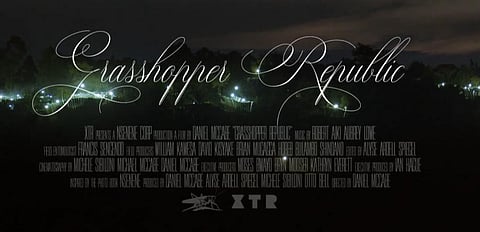

Sometimes you stumble upon fascinating films when least expected. Daniel McCabe’s Grasshopper Republic has been one such serendipitous discovery. The film revolves around Uganda’s grasshopper industry, an unusual premise. However, little did I anticipate getting easily drawn into the world of the film and staying riveted through its 94-minute duration.
Based on Michele Sibiloni’s (who co-shot the film along with Daniel and his brother Michael McCabe) photobook, ‘Nsenene’, the environmental documentary follows a group of trappers as they go about catching elusive grasshoppers that are considered a highly nutritious delicacy. It is a booming trade that has turned some into millionaires.
The film sets the context with the powerful opening sequence of human hands reaching out with wads of notes and exchanging them for fistfuls of the tasty bugs lying packed in several sacks. However, there is more to it than flavour and fortune. McCabe’s film doesn’t load the viewers with heavy-duty facts, figures, or statistics. But takes us deep into the world, making us experience the several conflicts of interest at the heart of this microcosm, the predicaments regarding the human and environmental toll of an economic activity.
“Patience Pays”, says the van of one of the trappers. There is the arduousness and toil of those involved in the profession—travelling far and wide, with heavy equipment like drums, iron sheets, generators, and light bulbs to build contraptions for catching grasshoppers. They remain separated from families for long periods—you forget us when you go, complains one member.
The bright lights used to attract the insects affect their own eyes and insect bites play havoc with their skin. As the trappers go to remote forests and villages there are concerns among farmers about how giving space to set up traps alongside their fields will spoil their own maize produce. But then there are only a couple of months in a year for the grasshopper season for others to earn their living. At the end of the day, it’s all about the interconnectedness of life and an elemental hustle underlining it.
McCabe just lets the ideas flow—about environment, climate, sustainability, labour practices and exploitative economy—for us to reflect on and draw our own conclusions. It’s a cheek by jowl existence and a fight for survival. You persisted in the business for long, comments a person to one of the labourers. “What other business could I have done without education?” he shoots back.
The shots of the landscape, hills and village homes, trees, birds and electric wires, the repair shops and shabby slums, and daily rhythms of human life are juxtaposed against closeup shots of grasshoppers, beetles, and several other insects to create a compelling portrait of the life forms of all kinds, the ecosystem, and the food chain.
McCabe has filmed over three grasshopper seasons which is then edited by Alyse Ardell Spiegel into an engaging thriller-like narrative with a fitting finale of a swarm of grasshoppers occupying the sky. It might feel like a horror fantasy—like Alfred Hitchcock’s Birds—but is actually a moment of relief and accomplishment for the workers, to finally be able to reap the benefits after all the struggles.
Grasshopper Republic is highly atmospheric and has a moody cinematic texture especially while capturing the nighttime, draped in fluorescent neon green lights. McCabe gets great access to the trappers but shoots with a mix of intimacy and distance. In fact, the visual flair and inventive soundscape (composer Robert Aiki Aubrey Lowe) took me back to Shaunak Sen’s All That Breathes—the diffused sun, the muddy feel and all-round pollution with grasshoppers literally falling from the sky.
“They come from the clouds” goes the local lore. There are throwaway mellow moments of such profound wisdom of the locals that resonate long after the film is over. Like when one of them talks about his own indigence: “Poverty finds you when you are strong. Have you seen any poor person who is not strong?” Rhetorical question and a heartbreaking truth.
Cinema Without Borders
In this weekly column, the writer introduces you to powerful cinema from across the world
Film: Grasshopper Republic